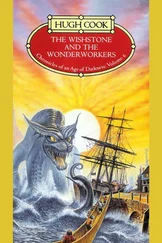Hugh Cook - The Wazir and the Witch
Здесь есть возможность читать онлайн «Hugh Cook - The Wazir and the Witch» весь текст электронной книги совершенно бесплатно (целиком полную версию без сокращений). В некоторых случаях можно слушать аудио, скачать через торрент в формате fb2 и присутствует краткое содержание. Жанр: Фэнтези, на английском языке. Описание произведения, (предисловие) а так же отзывы посетителей доступны на портале библиотеки ЛибКат.
- Название:The Wazir and the Witch
- Автор:
- Жанр:
- Год:неизвестен
- ISBN:нет данных
- Рейтинг книги:5 / 5. Голосов: 1
-
Избранное:Добавить в избранное
- Отзывы:
-
Ваша оценка:
- 100
- 1
- 2
- 3
- 4
- 5
The Wazir and the Witch: краткое содержание, описание и аннотация
Предлагаем к чтению аннотацию, описание, краткое содержание или предисловие (зависит от того, что написал сам автор книги «The Wazir and the Witch»). Если вы не нашли необходимую информацию о книге — напишите в комментариях, мы постараемся отыскать её.
The Wazir and the Witch — читать онлайн бесплатно полную книгу (весь текст) целиком
Ниже представлен текст книги, разбитый по страницам. Система сохранения места последней прочитанной страницы, позволяет с удобством читать онлайн бесплатно книгу «The Wazir and the Witch», без необходимости каждый раз заново искать на чём Вы остановились. Поставьте закладку, и сможете в любой момент перейти на страницу, на которой закончили чтение.
Интервал:
Закладка:
While Ek thus smoked, his audience waited in an uncomfortable silence. Ek’s strategic silence tempted them to take further risks, to propose plots, schemes and conspiracies; but even the boldest spirits amongst the wonder-workers felt they had dared sufficient dangers already.
Ek pursed his lips, as if to speak. The sorcerers waited for revelation. Ek blew a smoke-ring.
‘Thrug,’ said one of the sorcerers, pushed into speech by the tensions generated by silence, ‘may escape.’
Ek stared at him through a haze of grey smoke. Slowly, slowly, the curling-coiling smoke dissipated. Ek outbreathed again, once more veiling his face.
‘She may escape,’ continued the sorcerer, ‘because her tame wizard is building her a ship. A special ship. An airship, we believe. It looks like a — a bird’s nest. It is being constructed atop the pink palace.’
The end of Ek’s cigarette glowed red as he drew upon it. A crinkling brown line moved fractionally, eating its way down the cigarette. Ek breathed out, studied the lengthening ash at the end of his cigarette, tapped the ash into a clam shell, coughed harshly, spat, then said: ‘Priests have no powers. No temporal powers. That may change. When Aldarch the Third triumphs in Talonsklavara, it may change with remarkable rapidity. For the moment we priests merely watch. What others do is their business. But what they do and what they do not will be noted. Noted and remembered. In time.’
At the conclusion of this speech, Ek folded his hands in his lap and studied the sorcerers assembled in his presence. Studied them as if he were committing their faces to memory. He had given them a clear message. He had not told them to move against Justina Thrug; fear of the Crab had restrained him, though the letter of the law was his excuse. But he had given them clear warning that he would remember everything they did or did not do.
And, in due course, would give evidence.
‘Go,’ said Ek. ‘You are dismissed.’
The sorcerers made reverence to Master Ek then departed with troubled minds. Ek had made his wishes clear. They were to move against Justina Thrug. Furthermore, he had indicated how it could be done without arousing the wrath of the Crab; a meticulously maintained cordon sanitaire around the island of Jod would suffice to keep the Crab in ignorance. As for the question of the flying ship, that was something for the sorcerers to attend to themselves.
It could be done.
But the prospect of a head-on clash with Justina and her allies was scarcely something the wonder-workers welcomed, for they feared her abilities greatly, and suspected that moves against her might well compromise their own health and happiness.
Not to mention their lives.
As the sorcerers departed, the idling winds strengthened to a purposive breeze which held the promise of better things yet to come; but this good omen failed to lift the spirits of those upon whom Ek had laid such a heavy burden.
While Master Ek had been conducting his lengthy and theatrical audience with certain senior wonder-workers, a much younger and comparatively inexperienced sorcerer, Nixorjapretzel Rat by name, had been waiting for a personal interview with Ek. When Ek dismissed the wonder-workers, Rat heard them depart, their footsteps clunking down the stairs on the southern side of the house, their querulous voices raised in unintelligible conversation which faded out of earshot as they trooped along Hojo Street.
But Rat himself was not called to Ek’s presence.
Instead, he was left to stew.
Nixorjapretzel Rat was sitting on a chair. The chair was on a verandah. This shaded portico was on the northern side of Master Ek’s mansion atop Pokra Ridge, and afforded the outlooker with a view across Master Ek’s back garden, across a steeply descending slope largely given over to market gardens, and then across a great many leagues of the wastelands of Zolabrik.
Nixorjapretzel Rat had scant appetite for the view.
Another desire temporarily dominated his existence.
Nixorjapretzel Rat wished to urinate.
This urge possessed him sixty times a day, though until the present troubles he had scarcely needed to relieve himself more than twice or thrice between the sounding of the sun bells and bat bells. Young Nixorjapretzel had already taken himself off to a quack, who had pronounced him the victim of boblobdidobaltharbi (for which read nervous enuresis). The quack had recommended a long holiday combined with a programme of massage and sunbathing. Unfortunately Rat had no time for a holiday, had suffered a slipped disk on his first and only visit to a professional masseur, and already endured regrettable side effects as a result of his exposure to the sun.
‘Excuse me,’ said Rat to a passing servant, ‘is there a place where I might avail myself of the second minor pleasure?’
The grey-skinned servant expressed incomprehension in the Janjuladoola manner; that is to say, he raised his hands to nipple-height and twiddled his fingers.
‘Have you no ears?’ said Rat, mortally offended.
It happened that Nixorjapretzel Rat was of the Janjuladoola people. Not only was he of that race: he also had the honour of having been bom in Obooloo itself. While he had dwelt in the cold and mountainous realms of Ang, his skin had always displayed the luxuriant grey which was his birthright. But Untunchi-lamon’s harsh and relentless sun had wrought curious changes in his pigmentation, giving his skin a slightly reddish tinge. In consequence, young Nixorjapretzel was sometimes mistaken for an Ebrell Islander, which led members of the Superior Race to pretend that his efforts to speak the Superior Tongue fell short of comprehension.
The servant twiddled his fingers some more. Then departed. Rat raised his hands, pointed in the direction of the retreating racist, and muttered:
‘Vo. Vo bigamo. Vo bigamo skoreeth. Japata!’
On an instant, the back of the servant’s shirt disintegrated into a mass of seething colours. The servant cast a startled glance at Rat. Then fled. Leaving a cloud of harlequin butterflies flicker-floating in the air. Nixorjapretzel Rat was somewhat disappointed, for he had meant the servant to be incinerated on the spot. On reflection, though, the sorcerer was inclined to be glad that his magic had gone wrong, for Master Ek might have been annoyed had one of his servants been reduced to a heap of smouldering ashes, and Ek’s annoyance might swiftly have proved lethal for Rat.
The butterflies scattered on the ship-shifting winds now blowing across the city of Injiltaprajura. The same winds stirred through the shrubbery of the gardens of Mansion Ek; but with much reduced force, since walls sheltered those gardens. In those gardens, some thin and stunted sprite bamboo struggled for survival. This cold-climate plant had been imported to Ang from the northern continent of Tameran; it thrived in the cold uplands which surrounded Obooloo, but barely survived in Untunchilamon’s realms of fever heat and sunstroke. Still, Master Ek’s gardeners did their best to make the plant grow, for it was greatly prized for its grey foliage.
The paltry plantings of sprite were overtopped by luxuriant stands of fist-thick green bamboos native to the tropics. The tight-furled spears of fresh upthrusts of green spoke of fervent growth, of prodigal fecundity, of life imbued with a positively copulatory passion. Such brazen spear-thrust lust roused uneasy thoughts in the fidgeting Rat, who had committed himself to celibacy for fear of contracting some of the lethal venereal diseases which ran rife amongst Untunchilamon’s population.
Standing clear of both species of bamboo were plantings of banana trees, their broad leaves shredded to fronds by recent fraughts of bad weather. Like the bamboos, they too yielded to the whims of the light-lilting flirts and quirks of wind which stooped beneath the guardian walls; but the paw-paw trees, on the other hand, seemed to dwell in a different climate, for their close-stacked leaves were reluctant to answer to such cajolery. As for the lone needle-rose, pride and joy of Master Ek’s gardener, that spine-spiked monstrosity remained stubbornly immobile; for no freak of weather could move a needle-rose, not the occasional whisper-winds of Fistavlir nor the massed force of those full-fledged hurricanes which sometimes (once a century on average) descended upon the city of Injiltaprajura.
Читать дальшеИнтервал:
Закладка:
Похожие книги на «The Wazir and the Witch»
Представляем Вашему вниманию похожие книги на «The Wazir and the Witch» списком для выбора. Мы отобрали схожую по названию и смыслу литературу в надежде предоставить читателям больше вариантов отыскать новые, интересные, ещё непрочитанные произведения.
Обсуждение, отзывы о книге «The Wazir and the Witch» и просто собственные мнения читателей. Оставьте ваши комментарии, напишите, что Вы думаете о произведении, его смысле или главных героях. Укажите что конкретно понравилось, а что нет, и почему Вы так считаете.












